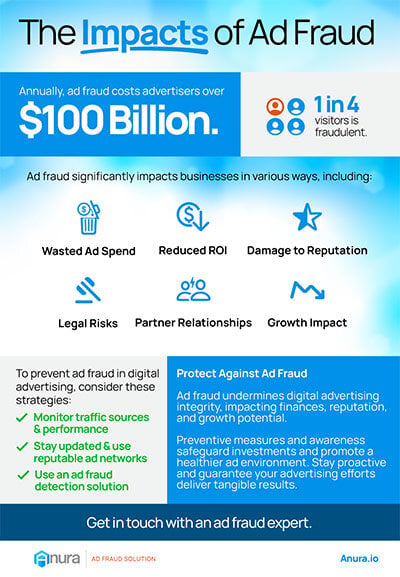
What is Click Fraud?
Click fraud occurs when automated scripts, bots, malware, or human perpetrators mimic real web browser visitors to accrue charges on a per-click basis without actual interest in the advertised link.
Traditional click fraud detection software struggles with accurately identifying human fraudsters and can generate high rates of false positives, inadvertently blocking legitimate customers. To keep up with the evolution of ad fraud, marketers need sophisticated click fraud protection software.
What is Click Fraud?
Click fraud occurs when automated scripts, bots, malware, or human perpetrators mimic real web browser visitors to accrue charges on a per-click basis without actual interest in the advertised link.
Traditional click fraud detection software struggles with accurately identifying human fraudsters and can generate high rates of false positives, inadvertently blocking legitimate customers. To keep up with the evolution of ad fraud, marketers need sophisticated click fraud protection software.
Anura stops click fraud cold with Search and Social Protect™

Anura is the most accurate and reliable way to stop click fraud. Anura’s real-time detection identifies bots, malware, and human-based fraud from click farms. With the industry’s leading accuracy measure (99.999%) when identifying fraud, you can be confident that the visitors you generate from your ad campaigns are real people.
Anura protects against:
- Click fraud
- Competitor fraud
- Influencer fraud
When Anura marks a visitor as fraudulent, our Search and Social Protect™ automatically hides your ads from being shown to fraudulent visitors on platforms like Google, Microsoft Ads, Instagram, Facebook, Tik Tok, Twitter, YouTube, and LinkedIn.
No need to apply for refunds.
Anura is a proactive click fraud prevention software that automatically hides your ads from fraudsters, so there's no need to apply for refunds. You do not need to waste time getting “reports” or filling out forms requesting refunds when there is little to no chance of actually getting a refund.
Whether you're running an advertising network or trying to reach potential customers for your business, leveraging the best click fraud software can help detect and prevent instances of fraud.
Benefits of using Anura to stop click fraud.
Anura's advanced click fraud protection utilizes real-time analytics and expertise to deliver precise fraud detection. Consistent click fraud monitoring effectively distinguishes between genuine user engagement and fraudulent activities to make sure every ad dollar counts.
Money Savings
By eliminating click fraud from your PPC campaigns, you can make your advertising budget stretch further—improving your ROI for every dollar you spend on PPC advertising.
Improved Campaign Performance
Removing fraudulent clicks results in more clicks coming from real consumers allowing you to see what really works and who your real audience is so you can better optimize your marketing campaigns.
Less Sales Team Time Wasted
Having to chase down the bad leads caused by fraud is a waste of team resources. Anura helps you remove the bad clicks from your campaigns, focusing your sales team on quality leads that generate sales and income.
Money Savings
By eliminating click fraud from your PPC campaigns, you can make your advertising budget stretch further—improving your ROI for every dollar you spend on PPC advertising.
Improved Campaign Performance
Removing fraudulent clicks results in more clicks coming from real consumers allowing you to see what really works and who your real audience is so you can better optimize your marketing campaigns.
Less Sales Team Time Wasted
Having to chase down the bad leads caused by fraud is a waste of team resources. Anura helps you remove the bad clicks from your campaigns, focusing your sales team on quality leads that generate sales and income.
How does Pay-Per-Click Fraud impact you?
Fraud is rapidly evolving. These days, the question’s not if you will experience click fraud, but when. This billion-dollar industry can wreak havoc on your marketing efforts and bottom line.
It Wastes Your Ad Spend
Fraudulent clicks from bots and click farms drain your ad budget, reducing your overall return on investment (ROI). Why? Because these clicks are coming from fraudulent sources that won’t convert into real customers!
It Distorts Your Marketing Data
Fraudulent clicks distort your marketing data. Your campaign optimization is flawed, based on bad information, and results in few or no real conversions. This, in turn, leads to wasting money on the wrong keywords and audiences in your PPC campaigns.
It Gives Your Competitors the Advantage
Click fraud can quickly eat through your available advertising budget and run your campaigns dry in minutes. This prevents real customers from seeing your ads. Instead, the customers you’re targeting will be presented with your competitors’ ads—giving them a major advantage.
It Wastes Your Ad Spend
Fraudulent clicks from bots and click farms drain your ad budget, reducing your overall return on investment (ROI). Why? Because these clicks are coming from fraudulent sources that won’t convert into real customers!
It Distorts Your Marketing Data
Fraudulent clicks distort your marketing data. Your campaign optimization is flawed, based on bad information, and results in few or no real conversions. This, in turn, leads to wasting money on the wrong keywords and audiences in your PPC campaigns.
It Gives Your Competitors the Advantage
Click fraud can quickly eat through your available advertising budget and run your campaigns dry in minutes. This prevents real customers from seeing your ads. Instead, the customers you’re targeting will be presented with your competitors’ ads—giving them a major advantage.
Don’t let click fraud negatively impact your advertising efforts.
You need effective click fraud prevention to stop click fraud and PPC Scams.
Sophisticated click fraud schemes use a variety of tactics to thwart traditional anti-fraud and anti-bot measures like CAPTCHA tools, such as:
Real Humans in Click Farms
The simple truth is this: anti-bot tools like CAPTCHA don’t work against human-based fraud. Click farms with humans operating a variety of devices to repeatedly click on ads can barrel through these bot detection tools like they aren’t even there.
Improved Bot Programming
Fraudsters are continuously updating and upgrading the bot programs to counter traditional anti-fraud measures. Modern bots can closely mimic human behavior to fool less sophisticated click fraud detection tools and basic bot filters.
Device Spoofing and Multi-Device Setups
Fraudsters often use device spoofing tools to change the device OS, web browser, IP address, and other device specifications between clicks—or use multiple devices at once. This makes it difficult to identify all of the fraudulent traffic coming from a single source.
Foreign Jurisdictions and Laws
While some click farms and other fraudsters are located within the U.S., many of them are set up in countries where these operations aren’t illegal or don’t have extradition treaties with the U.S. This makes it nearly impossible to stop click fraud through legal channels.
Real Humans in Click Farms
The simple truth is this: anti-bot tools like CAPTCHA don’t work against human-based fraud. Click farms with humans operating a variety of devices to repeatedly click on ads can barrel through these bot detection tools like they aren’t even there.
Improved Bot Programming
Fraudsters are continuously updating and upgrading the bot programs to counter traditional anti-fraud measures. Modern bots can closely mimic human behavior to fool less sophisticated click fraud detection tools and basic bot filters.
Device Spoofing and Multi-Device Setups
Fraudsters often use device spoofing tools to change the device OS, web browser, IP address, and other device specifications between clicks—or use multiple devices at once. This makes it difficult to identify all of the fraudulent traffic coming from a single source.
Foreign Jurisdictions and Laws
While some click farms and other fraudsters are located within the U.S., many of them are set up in countries where these operations aren’t illegal or don’t have extradition treaties with the U.S. This makes it nearly impossible to stop click fraud through legal channels.
FAQ
What is click fraud?
Click fraud is a fraudulent practice where automated scripts, bots, malware, or human fraudsters imitate legitimate visitors of a web browser to generate a charge-per-click without any genuine interest in the ad's target link.
Analyzing visitor behavior can help uncover and prevent click fraud on ad campaigns. Whether you're running an advertising network or trying to reach potential customers for your business, leveraging machine learning and human expert analysis can detect and prevent instances of click fraud.
How can I prevent click fraud?
Businesses trying to earn more revenue through digital marketing quickly learn the value of tracking fraudulent activities. Anytime paid traffic is involved, there will be those who seek to take advantage of the system. To prevent click fraud, the only solution today is to seek a company that specializes in fraud mitigation.
Data science enables companies running click campaigns to get fraud protection, potentially saving them thousands in lost advertising capital. By continually scanning thousands of data points, it's possible to see which clicks are from real visitors and which ones are fake or accidental.
How common is click fraud?
Click fraud accounts for nearly 60% of the $100 billion total cost of ad fraud in 2022, whether on a search engine or as part of a display ad campaign. This drives up advertising costs for companies, pushing their ad budgets into the red before they can produce the expected sales.
How does click fraud impact consumers?
Click fraud is a serious issue not just for marketers but also consumers. That's because it can impact the cost of online advertising for companies which ultimately increases the prices that consumers pay for goods and services. In some of the worst cases, click fraud can also be used to distribute malware, causing further financial damage. For companies advertising online, getting the help of fraud prevention software is essential.
How do I know if I’m a victim of click fraud?
It's not always easy to identify click fraud. Whether you're running click campaigns or utilizing display advertising networks, your traffic quality could be far worse than you might realize. If you’re seeing high CTRs with no conversions, traffic from odd sources, weird spikes in clicks, more abandoned shopping carts, rapidly draining budgets or high bounce rates, these are all signs of click fraud.
What are the consequences of click fraud?
Click fraud has the potential to completely change the outcome of your digital ad campaigns. Invalid traffic to Google Ads with a high cost per click can rapidly drain the coffers of even a well-funded advertising budget. This means you won't be able to reach as many of your ideal customers as you could have when you started the campaign.
Detecting invalid traffic and other forms of click fraud is critical to maximizing the ROI of your ads. Beyond the copy and creative of your digital ad, there is simply no better way to improve your ROAS.
What are some common click fraud scams?
Click fraud scams can attack digital ad campaigns in numerous ways. Common types of scams include click farms, bot traffic, fake clicks, and link masking to deceive online visitors into clicking. Fraudulent activity can be motivated by many factors, from heated business competition to earning affiliate income. No matter if you're marketing with paid search, display ads, or social media, there's a chance you'll fall prey to one of these scams.
How has click fraud changed over time?
As the ways to advertise online have evolved over the years, so have ways to defraud companies of their ad campaign dollars. Let's look at some of the examples.
Google Ads
With the rise of Google Ads campaigns, inventive new methods of generating invalid clicks have exploded in number. Suspicious clicks from one computer could be competitor clicks or bot clicks, for example.
Invalid Traffic
Invalid activity can drive traffic to your site that seems promising but never turns into sales. The advertiser pays their bill thinking they've reached human visitors, but in reality, it's just fake traffic created by fraudsters. This problem has increased substantially over the years with the decline in computing costs.
Fraudulent Clicks Based on Geographic Locations
Local companies who are trying to maximize their marketing ROI know how important it is to localize their advertising efforts online. Unfortunately, fraudsters know this too, so they've found ways to make it appear as though their location is a paying customer nearby.
How can you raise your degree of click fraud protection?
Protecting your business from click fraud starts with data-driven decisions made by the watchful eye of experts. From simply blocking fraudulent clicks on your ads to flagging suspicious activity, Anura helps you avoid overpaying for ads that don't produce.
Anura empowers companies with a complete solution for catching and preventing click fraud. We also offer an easy-to-understand dashboard that shows you what clicks have been blocked, providing complete transparency into the process. Discover how Anura lowers your chances of false positives when blocking click fraud. Contact us to get started today.
What is competitor fraud?
Competitor Fraud occurs when a fraudster repeatedly clicks on the competitor’s ads to rapidly drain a competitor’s ad budget in order for their own ads to rank higher or run unopposed. In some instances, a competitor can click on your online ads in an attempt to drive up the amount that you pay for search term keywords — even when targeting extremely expensive terms.
What is influencer fraud?
Influencer fraud occurs when an influencer is either using bots or other techniques to artificially inflate their engagement with the advertiser. Sometimes, the influencer isn't even a real person.
There's a major problem with getting fake likes from click farms: it skews your marketing data. Social media platforms can map out the demographics and psychographics of an entire population based on what posts they like — meaning that if half the audience is built solely off fakes, then those metrics won't be accurate. This could result in them trying to put content before audiences unqualified for such information and would be disastrous for your bottom lines.
How do competitors use influencer fraud?
Competitor fraud occurs when a brand hacks and creates fake profiles to follow and like a competitor's account to hurt their business and get into their followers' feeds. They also might hack into competitors' accounts and post inappropriate content. It can be costly for the hacked company in terms of time spent cleaning up their mess, but it also poses serious risks to people whose accounts were taken over by hackers — what might they post? How will this affect customer engagement rates or sales revenue streams if we see inappropriate content popping up all over social media channels?
How do I protect myself against click fraud, competitor fraud, and influencer fraud?
Using our Search and Social Protect feature, your ads will be hidden automatically to protect your budget and ensure that your ads are only being seen by real people. Never worry about your ads being shown to fraudulent visitors again.
Does Anura work with Mobile and CPI (Cost Per Install) campaigns?
Yes, Anura validates if the visitor on any web asset is Real or Fake; Fake being either a Bot, Malware, or Human Fraud. When the Anura code is run on a mobile device (either within an app, browser, or during the install process) it can validate that visitor in real-time.

